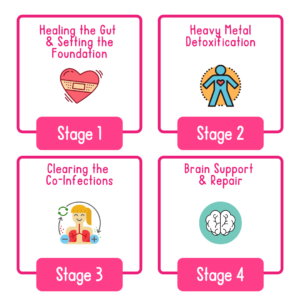What is a Sensory Processing Disorder?
One of the greatest concerns is that parent’s do not understand that it is not that their child will not act appropriately or do what they are asked, but that the child cannot. Commonly seen as defiant, a child with sensory processing issues or unregulated neurological functioning is often incapable of changing his behavior due to a disorganized brain. Our society has programmed us to believe it is just about behavior. These people are thought of as lazy, or that they are just being disrespectful. My husband and I were told by professionals for several years that we needed to be firmer with discipline as parents. They were wrong!
Many of the ordinary daily tasks or responses we take for granted are extremely challenging for those with sensory processing disorders. The child may or may not be on the autism spectrum. There is often MIS-diagnosis due to these behaviors. Learn about sensory processing disorders, (SPD) and exercise patience with your child. It is as hard for him not to be able to act appropriately as it is for you to watch it. Their self esteem is often damaged due to these issues. The incapabilities of your child come from a neurological level.
What May Have Caused Sensory Processing Issues In My Child?
Confused neurological states start in the womb. The central nervous system has become disorganized. The symptoms of sensory processing disorder range greatly.
The four sensory systems are:
1. Tactile problems: can create the refusal to eat due to issues of both tastes and textures of various foods. Using a fork can be quite difficult. This is the same for holding a pencil and handwriting. Proper tactile sense is necessary for language development. They need proper awareness of their mouth, lips and tongue.
2. Vestibular issues: come from the inner ear. They create balance and movement problems. Proprioception or your ability to know where your body is in space is very common. Sometimes people just think their child is clumsy because he does not pay attention to what he is doing. He unconsciously tiptoes because it lessens the touch on the bottom of his feet with each step.
He may desire a lot of stimulation or prefer none at all. Trouble with over-responsive vestibular issues can be extreme nausea when riding in a car or playing on the swing. He becomes dizzy easily. If this child is vestibular seeking he craves intense movement. He likes to hang upside down and enjoys rocking. He may play on the swing for hours. Those with vestibular under-responsiveness may have trouble getting going but have a hard time stopping once they’re moving.
3. Visual over-responsiveness: creates many fears. They may over-respond or under-respond to fast moving, or shiny objects. They have poor visual discrimination.
4. Auditory issues: create fear and anxiety with noise. An auditory sensory craver loves loud noise and action. Someone with auditory problems may have difficulty putting their thoughts into words. The cause for auditory problems may have been ear infections. The temporal lobes of the brain are also associated with speech. In Craniosacral therapy I work with the temporal lobes for this issue.
Some common symptoms of SPD are:
•“Sensory Modulating Problems” or their ability to regulate themselves. This can be overreacting or under reacting to any stimuli.
•“Sensory Discrimination Problems” create difficulty in distinguishing one stimulus from another.
•“Sensory-Based Motor Problems” have to do with motor control and their ability or inability to move in the way they consciously choose to.
•“Associated Regulatory and Behavior Problems” can be a combination of developmental problems and simply poor biological sensory processing. This may or may not be actual SPD.
Know that no two people are the same. We are born with our very own biology and neurological system. Each symptom can range from mild to severe. It is common to witness both consistent and inconsistent behaviors.
Who Can Help with Sensory Processing Issues?
An occupational therapist who specializes in these disorders and with children on the autism spectrum is your best resource for help. Ask for a SIPD (sensory integration processing disorders, dubbed “sipped”) certified occupational therapist, if possible. They have additional training in diagnosis and treatment of sensory processing disorders. For a directory of occupational therapists see www.healthgrades.com/occupational-therapy-directory. Another good resource site is www.sensory-processing-disorder.com. They have a directory to help you find an occupational therapist near you.
♥
Get your FREE download of fun at-home sensory games to help balance your child and create play activities they’ll enjoy, anytime, anywhere. Great gifts too! Get the free guide at NaturallyRecoveringAutism.com/fun.
♥

Get Your Free Food Guide!
Quickly Reduce Your Child’s Symptoms of Autism by Eliminating 7 Foods Most People Consume Daily!
The first crucial step of autism recovery is to begin restoring health to the gut and the immune system.
The health of the gut is directly linked to the health of the brain and therefore to the symptoms of autism. In fact, 80% of the immune system comes from the gut so if the gut is not healthy, then the brain can’t thrive, and the immune system is compromised. It’s a vicious cycle, but thankfully, it’s one that we can put an end to by first eliminating harmful foods.
- Harmful Foods: Identify the foods that worsen autism symptoms and understand the science behind their impact.
- Smart Food Choices: Learn about easy dietary swaps that can significantly enhance sleep, clarity of thought, and emotional well-being.
- Practical Implementation: Get valuable tips on how to implement these dietary changes easily and effectively.
This is for informational purposes only and is not meant to diagnose or treat. Every child’s level of recovery is different. No two people are the same. It is never implied that all children will have the same outcome. Results are all based on individual biology and the work that is done. This process takes time and various steps, effort and resources need to be weighed. Our programs are intended to help you become more knowledgeable and guide you to help bring your child a better quality of life, whatever that may be. We want to help by giving great content, direction and strategies that move you forward. Nothing on this page or any of our websites is a promise or guarantee of results or future outcomes. The results on this page and any of our websites are not typical or promised. In fact, there will be people who purchase this and other programs and never put the work into implementing the strategies taught and therefore will achieve little to no results. Our more detailed earnings disclaimer, privacy policy, and terms and conditions for this program and website can be accessed via the links below. We hold ourselves (and you) to a high standard of integrity. We are cheering you on every step of the way.












